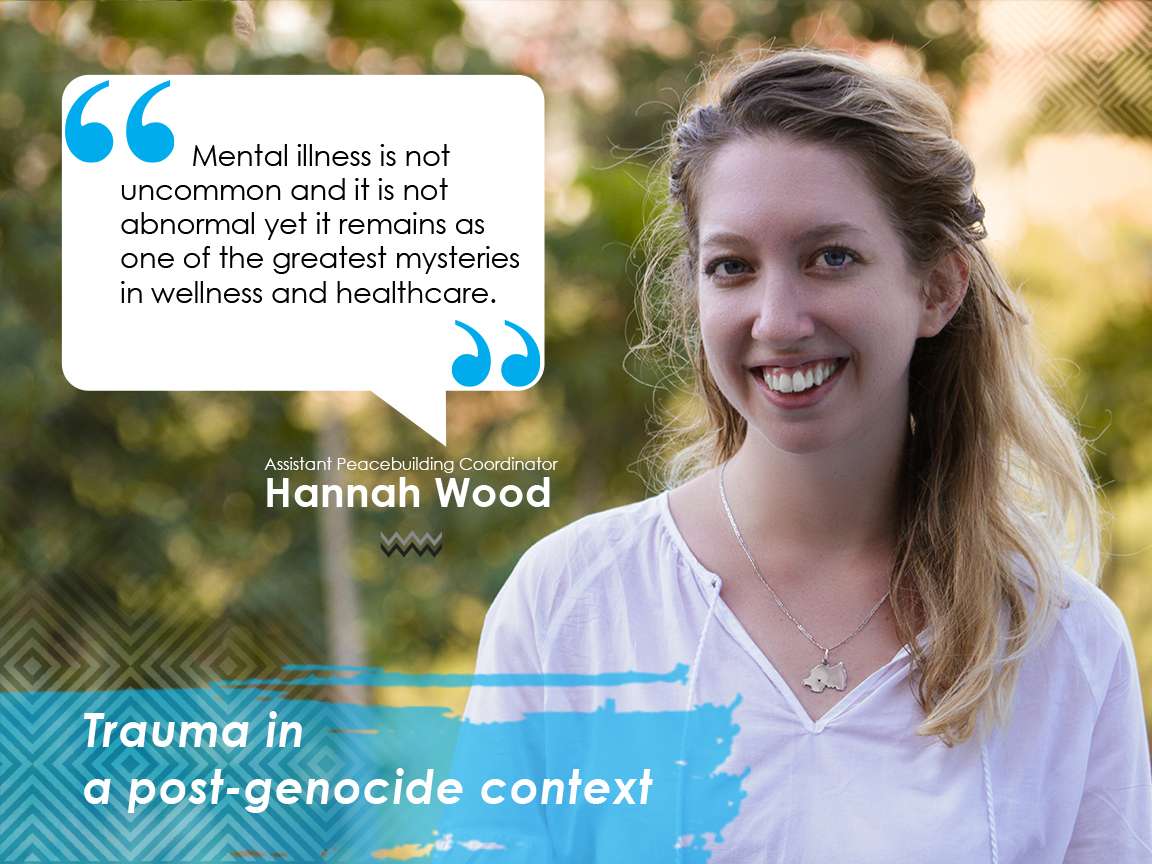No single year of commemoration looks the same in Rwanda. Each year a new challenge presents itself, themes change, conversations start, safe spaces are formed, dialogues are ignited, presentations are made, performances and books are presented and authored.
This year’s 25th commemoration of the 1994 Genocide against the Tutsi is the period when the National Trauma Symposium, the first of its kind was hosted. The Rwanda Psychology Society, Ministry of Health, Imbuto Foundation, ARCT-Ruhuka, Never Again Rwanda and Rwanda Biomedical Center along with many other esteemed partners convened healing and trauma experts for two days to discuss trauma management and grassroots initiatives as well as the national policy to support and expand mental health care. The event, along with many other ongoing programs can be an impactful shift in how Rwandan communities view mental illness and traumatic stress. By a sort of osmosis, research and personal exploration I can confidently share, from my viewpoint, what traumatic consequences I observe today as a result of the 1994 Genocide against the Tutsi.
The experiences of trauma, chronic anxiety, depression and mental illness in Rwanda are vast. This trauma is attributed to many events and experiences including the experiences of refugees, victims and survivors of genocidal crimes carried out prior to April 1994, widows, orphans and children born out of rape, children born after the genocide and children who survived alone amidst large families completely wiped out during the 1994 Genocide against the Tutsi. As time passes, new stories and deeply wounding events are uncovered. New mass graves and pieces of evidence are also uncovered each year which can be re-traumatizing for many and raises many questions for others. Psychologists working in Rwanda can account that treating trauma in Rwanda is challenging because the story of how survivors suffered is never fully complete. New information and responsible qualitative data collection can help the next generation and newly trained psychologists and psychiatrists to strategically support Rwandans from all demographics. The ability to share the stories we see published and presented today has only been made possible by the work of brave and resilient caregivers, psychologists, clinicians and trained specialists including those supporting and working with ARCT-Ruhuka, AERG, CNLG, NAR, and the Rwanda Psychology Society.
Mental illness is not uncommon and it is not abnormal yet it remains as one of the greatest mysteries in wellness and healthcare. Not enough is known about the human psyche even after centuries of research and findings. Furthermore, it is human nature to quickly try to contextualize those topics or ideas which we do not understand or agree with. Citizens suffering from mental illness are quickly labeled, judged and ridiculed by peers and family who are uneducated on the topics related to mental health. Rwanda’s experience is unique and therefore, the response must also be contextual taking into account the immense delicacy of the matter. Mental illness, addiction and traumatic wounds for survivors, returnees, post-genocide youth and returned ex-combatants and perpetrators have been a constant snag in familial fabrics. The solutions to Rwanda’s mental health needs must be found within existing structures, safe spaces that have existed for decades and have been laid within small communities across all districts of the country. Experts and leadership agree that national policy and procedures must be written and abided by not just at large scale institutions and organizations but among local leaders. There are different programs and interventions in different institutions like NAR’s Societal Healing and Participatory Governance for Peace Program, which brings together diverse groups to tackle trauma and deep mental wounds through group-trauma therapy.
In the past 25 years since the 1994 genocide against the Tutsi, Rwanda has risen from the ashes not due to the actions of external leaders or international aid but because Rwandans chose forgiveness, unity and lasting change. The healing process is courtesy of the resiliency, brave leadership and a willingness to have a better future for the next generation as demonstrated by over the last two decades. A community-based response to traumatic stress and mental illness backed by teams of trained psycho-therapists for quality assurance and the best chance of sustainability can effectively release current weight felt across communities and families in Rwanda today. Together, Rwanda is stronger; ambitious youth and trained professionals ought to work side by side to make this vision a reality.


